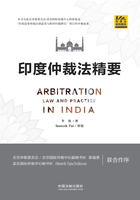
序
Foreword
Lord Mustill,in one of his forewords to a book remarked that the writers of forewords often begin by saying,no doubt sincerely,how delighted they have been by the request to contribute and for him it was not only a delight but an honor too. With equal sincerity,I completely echo his words.
马斯蒂尔勋爵在他为一本书的作序中写道:写序言的人通常会在一开头说,毫无疑问,他们非常地高兴接到了邀请自己出力的请求,但对他而言,这不仅是一种喜悦,也是一种荣誉。对于此话,我真诚地完全认同。
The importance of this book can hardly be overstated. Following the adoption of Model Law by India in 1996,there have been significant amendments to the Indian Arbitration Law. The Amendments of 2015 and 2019 aim at fostering India’s position as a hub of International Arbitration. Since theses amendments,it would not be wrong to say that the landscape of arbitration has seen a drastic change. There is a growing realisation and a positive move of arbitrations from ad-hoc arbitrations to institutional arbitrations. India has recently witnessed the emergence of several arbitration institutions that aim to popularize institutional arbitration as an alternative for dispute resolution. One of the underlying objectives behind this trend is to boost confidence among foreign counterparties from jurisdictions that do not share a common law system or preference for ad-hoc arbitration such as China. Chinese companies doing business in India can possibly be one of the largest categories of beneficiaries from such a trend towards institutional arbitration. As the Secretary General of Mumbai Centre for International Arbitration (MCIA),one of most prestigious arbitral institutions in India,I am fortunate to be a witness to such progress and I am proud of the achievements that have been made over the years by the arbitration community in India.
这本书非常重要,重要到再怎么强调也不为过。继1996年印度基于《联合国国际贸易法委员会国际商事仲裁示范法》制定其仲裁法后,2015年和2019年的修正案都旨在加强印度作为国际仲裁中心的地位。自这些修正案颁布以来,印度仲裁的格局也发生了巨大的改变。越来越多的人认识到,仲裁正经历着从临时仲裁到机构仲裁的积极转变。最近,印度出现了多家仲裁机构,旨在推广机构仲裁作为解决争端的替代办法。这一趋势背后的根本目标之一,是为了增强那些来自非普通法系或不偏好临时仲裁的司法管辖区(如中国)的外国交易对手的信心。在印度开展业务的中国公司可能是机构仲裁这一趋势的最大受益者之一。作为印度最具声望的仲裁机构之一的孟买国际仲裁中心(MCIA)的秘书长,我很幸运地见证了这一进步,同时我也为印度仲裁界多年来取得的成就感到自豪。
Knowledge about the legal system of a counterparty’s home jurisdiction often boosts trust in commercial dealings. The increasing scale and complexity of economic ties between India and China has created an imperative for stakeholders to increase their awareness about the legal systems of both countries. In this context,a book that aims to educate Chinese readers about the evolution and development of Indian arbitration law is indeed a commendable and a timely initiative.
加强对交易对手所在国法律体系的了解,往往能够增强人们在商业交易中的信任。随着中印经济联系的规模扩大和复杂性增加,利益攸关方必须要加强对两国法律体系的学习和认识。因此,在这样的背景下,出版一本旨在帮助中国读者了解印度仲裁法演变和发展的书,的确是一项值得称赞的应时应势之举。
I am honored to be one of the first readers of this book. Written by leading experts of Indian law,the book discusses and covers in detail all important facets of arbitration in India,the evolution of jurisprudence of arbitration in India against the backdrop of international practices,in a clear and sensible manner. This book is an extensive commentary on the Indian Arbitration Act,1996 as amended in 2015 and 2019 and is a reflection of the maturity now reached by the Indian Arbitration community. It is a painstaking and diligent piece of work that can only be properly discharged by someone both familiar and competent in this field. Li Qin and Santosh Pai must be commended and congratulated for having undertaken this exercise,so well. I recommend this book to all readers interested in Indian arbitration and,in particular,to international practitioners who regularly deal with Indian companies. My only wish is to see further editions of this remarkable book.
我很荣幸能够成为这本书的首批读者之一。这本由印度法专家们撰写的书,以清晰而睿智的方式,详细讨论了印度仲裁的所有重要方面,以及在国际惯例的背景下印度仲裁法律体系的演变。它是对1996年印度《仲裁法》(2015年和2019年修订)的广泛评论,同时也反映了印度仲裁界目前的成熟度。它的撰写是一项艰苦和勤奋的工作,只有熟悉这一领域并具备相应能力的人才能够胜任此项工作。我必须赞扬和祝贺李钦和白大山出色地完成了这项工作,在此,我向所有对印度仲裁感兴趣的读者,特别是经常与印度公司打交道的国际从业者推荐这本书。我唯一的愿望是看到这部非凡作品的进一步版本。
Neeti Sachdeva
Secretary General
孟买国际仲裁中心秘书长